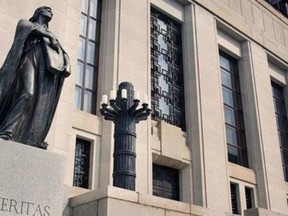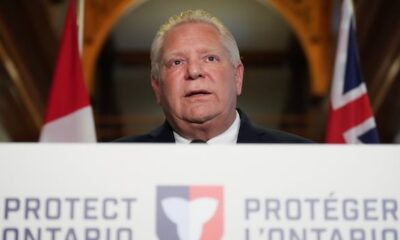World
Air Canada Strike: Union’s Resolve Challenges Government Action

The ongoing strike at Air Canada, involving flight attendants represented by the Canadian Union of Public Employees (CUPE), is set to conclude only through a negotiated settlement, as legal avenues for government intervention appear increasingly limited. The determination of CUPE, combined with public sentiment against Air Canada, poses significant challenges for the airline amidst ongoing negotiations.
Government attempts to intervene, including measures proposed by Labour Minister Payette Hajdu, have been deemed illegal. Recent legal interpretations of the Canadian Charter of Rights and Freedoms suggest that the right to strike is a fundamental component of collective bargaining. This shift was notably marked by a 2015 Supreme Court ruling in the case of the Saskatchewan Federation of Labour, where Justice Rosalie Abella asserted that the right to strike is now recognized as a constitutional right in Canada.
In her ruling, Justice Abella referenced various international labor laws and historical practices to support her position, effectively overturning decades of legal precedent that had previously denied constitutional protection for the right to strike. Her decision has led to a re-evaluation of tools traditionally used by governments to end strikes, such as back-to-work legislation.
The implications of this ruling are significant. In past cases, like a 2002 dispute involving striking workers at Pepsi, Chief Justice Beverley McLachlin highlighted the delicate balance required in labor relations, urging that such matters be resolved through legislative processes rather than judicial intervention. The 2015 ruling, however, marked a departure from this cautious approach, leading to dissenting opinions that cautioned against the broad interpretation of the right to freedom of association.
With the legal landscape shifting, the effectiveness of government interventions in labor disputes is increasingly contested. Notably, Ontario Premier Doug Ford previously invoked the notwithstanding clause to enforce back-to-work legislation for education workers in 2022, illustrating the lengths to which governments may go to assert control in labor disputes.
As the Air Canada strike continues, both CUPE and the airline are engaged in a battle for public opinion, with each side vying for support that could influence negotiations. The outcome of this dispute may hinge not only on the negotiations themselves but also on the broader implications of the legal interpretations surrounding labor rights in Canada.
The current situation underscores a fundamental shift in the relationship between labor unions and government, emphasizing the importance of negotiated settlements in disputes involving essential services. As Air Canada and CUPE move forward, the focus will remain on how effectively both can navigate the public relations landscape to secure their respective interests at the negotiating table.
-

 Politics4 weeks ago
Politics4 weeks agoSecwepemc First Nation Seeks Aboriginal Title Over Kamloops Area
-

 World5 months ago
World5 months agoScientists Unearth Ancient Antarctic Ice to Unlock Climate Secrets
-

 Entertainment5 months ago
Entertainment5 months agoTrump and McCormick to Announce $70 Billion Energy Investments
-

 Science5 months ago
Science5 months agoFour Astronauts Return to Earth After International Space Station Mission
-

 Lifestyle5 months ago
Lifestyle5 months agoTransLink Launches Food Truck Program to Boost Revenue in Vancouver
-

 Technology3 months ago
Technology3 months agoApple Notes Enhances Functionality with Markdown Support in macOS 26
-

 Lifestyle3 months ago
Lifestyle3 months agoManitoba’s Burger Champion Shines Again Amid Dining Innovations
-

 Top Stories2 months ago
Top Stories2 months agoUrgent Update: Fatal Crash on Highway 99 Claims Life of Pitt Meadows Man
-

 Politics4 months ago
Politics4 months agoUkrainian Tennis Star Elina Svitolina Faces Death Threats Online
-

 Sports5 months ago
Sports5 months agoSearch Underway for Missing Hunter Amid Hokkaido Bear Emergency
-

 Politics5 months ago
Politics5 months agoCarney Engages First Nations Leaders at Development Law Summit
-

 Technology5 months ago
Technology5 months agoFrosthaven Launches Early Access on July 31, 2025





















